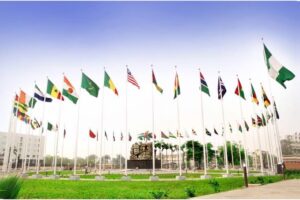
The year 1960 marked a watershed moment in African history, as 16 countries shed colonial shackles and gained independence. Dubbed the “Year of Africa,” this wave of liberation signaled a seismic shift in the global political landscape, redefining Africa’s identity and trajectory.
For centuries, European powers – France, Britain, Belgium, Italy, and others – had colonized and exploited Africa’s rich resources, suppressing local cultures and identities. The Scramble for Africa, which began in the late 19th century, saw European nations carve up the continent, imposing artificial borders and extracting natural resources.
The winds of change began to blow in the mid-20th century, as African nations demanded self-rule. Nationalist movements, led by charismatic leaders like Kwame Nkrumah, Julius Nyerere, and Patrice Lumumba, mobilized their people, advocating for independence and pan-African Unity.
In 1960, 16 African countries achieved independence:
1. Nigeria (Oct 1) – UK
2. Cameroon (Jan 1) – France/UK
3. Togo (Apr 27) – France
4. Mali (Sep 22) – France
5. Ivory Coast (Aug 7) – France
6. Burkina Faso (Aug 5) – France
7. Benin (Aug 1) – France
8. Niger (Aug 3) – France
9. Chad (Aug 11) – France
10. Central African Republic (Aug 13) – France
11. Gabon (Aug 17) – France
12. Republic of the Congo (Aug 15) – France
13. Mauritania (Nov 28) – France
14. Senegal (Apr 4) – France
15. Somalia (Jul 1) – Italy/UK
16. Democratic Republic of the Congo (Jun 30) – Belgium
The 1960 independence wave had far-reaching consequences that continue to shape Africa’s trajectory. The redrawing of Africa’s political map marked the beginning of a new era, as nations shed colonial legacies and forged their own paths. This wave of independence inspired global decolonization, as other nations around the world fought for self-rule. The fostering of pan-Africanism and regional unity promoted cooperation and solidarity among African nations, paving the way for the formation of the Organization of African Unity (OAU) in 1963.
The 1960 independence wave also shaped modern Africa’s identity and trajectory, empowering African leaders to take charge of their destiny. Economic development and cooperation became key priorities, as nations sought to overcome centuries of colonial exploitation. Cultural revitalization and identity assertion enabled Africans to reclaim their heritage and forge a sense of national pride. Furthermore, the empowerment of African leaders marked a significant shift in global politics.
Since gaining independence, these nations have navigated nation-building and self-governance, economic development and growth, cultural revitalization and identity assertion, regional cooperation and international relations, overcoming challenges and conflicts, and building democratic institutions.
Despite progress, Africa still faces numerous challenges, including poverty and inequality, conflict and instability, corruption and governance issues, health and education disparities, and environmental degradation. However, the continent also presents opportunities for economic growth and investment, demographic dividend and youth empowerment, innovation and technological advancement, regional integration and cooperation, and cultural exchange and global influence.
The independence of these 16 nations has left an enduring legacy, honoring African leaders who fought for freedom, recognizing the resilience and determination of African peoples, acknowledging progress made and challenges overcome, continuing the quest for unity, prosperity, and self-determination, and inspiring future generations.
Today, we reflect on this pivotal moment, celebrating Africa’s progress and looking toward a brighter future. The 1960 independence wave will forever be etched in history as a testament to Africa’s unwavering spirit and determination.
The timeline of African independence began with the Berlin Conference in 1885, which divided Africa among European powers. The post-WWII era sparked African nationalism, leading to the independence of Ghana in 1957 and the 16 nations in 1960. The Organization of African Unity (OAU) was formed in 1963, and the African Union (AU) was established in 2002.
Notable figures who played a key role in Africa’s independence struggle include Kwame Nkrumah, Julius Nyerere, Patrice Lumumba, Léopold Sédar Senghor, Nelson Mandela, Gamal Abdel Nasser, and Jomo Kenyat.
As Africa continue to Journey into this freedom, we hope for a transformation, that will put Africa on the pedestrian of Progress and Development.

